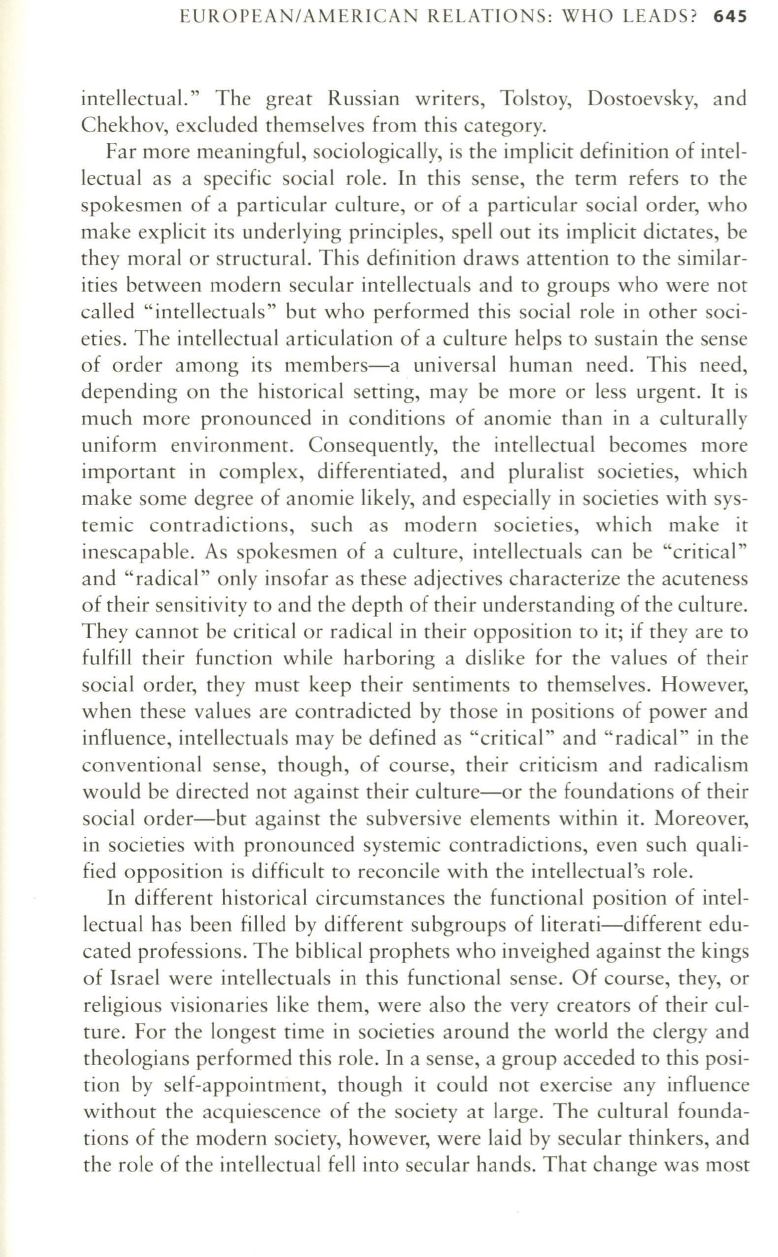
EUROPEAN/AMERICAN RELATIONS: WHO LEADS?
645
intellectual." The great Russian writers, Tolstoy, Dostoevsky, and
Chekhov, excluded themselves from this category.
Far more meaningful, sociologically, is the implicit definition of intel–
lectual as a specific social role . In this sense, the term refers to the
spokesmen of a particular culture, or of a particular social order, who
make explicit its underlying principles, spell out its implicit dictates, be
they moral or structural. This definition draws attention to the similar–
ities between modern secular intellectuals and to groups who were not
called "intellectuals" but who performed this social role in other soci–
eties . The intellectual articu lation of a cu ltu re helps to sustain the sense
of order among its members-a universal human need. This need,
depending on the historical setting, may be more or less urgent.
It
is
much more pronounced in conditions of anomie than in a culturally
uniform environment. Consequently, the intellectual becomes more
important in complex, differentiated, and pluralist societies, which
make some degree of anomie likely, and especially in societies with sys–
temic contradictions, such as modern societies, which make it
inescapable. As spokesmen of a culture, intellectuals can be "critical"
and "radical" only insofar as these adjectives characterize the acuteness
of their sensitivity to and the depth of their understanding of the culture.
They cannot be critical or radical in their opposition to it; if they are to
fulfill their function while harboring a dislike for the values of their
social order, they must keep their sentiments to themselves. However,
when these values are contradicted by those in positions of power and
influence, intellectuals may be defined as "critical" and "radical" in the
conventional sense, though, of course, their criticism and radicalism
would be directed not against their culture-or the foundations of their
social order-but against the subversive elements within it. Moreover,
in societies with pronounced systemic contradictions, even such quali–
fied opposition is difficult to reconcile with the intellectual's role.
In different historical circumstances the functional position of intel–
lectual has been filled by different subgroups of literati-different edu–
cated professions. The biblical prophets who inveighed against the kings
of Israel were intellectuals in this functional sense. Of course, they, or
religious visionaries like them, were also the very creators of their cul–
ture. For the longest time in societies around the world the clergy and
theologians performed this role. In a sense, a group acceded
to
this posi–
tion by self-appointment, though it could not exercise any influence
without the acquiescence of the society at large. The cultural founda–
tions of the modern society, however, were laid by secular thinkers, and
the role of the intellectual fell into secular hands. That change was most


